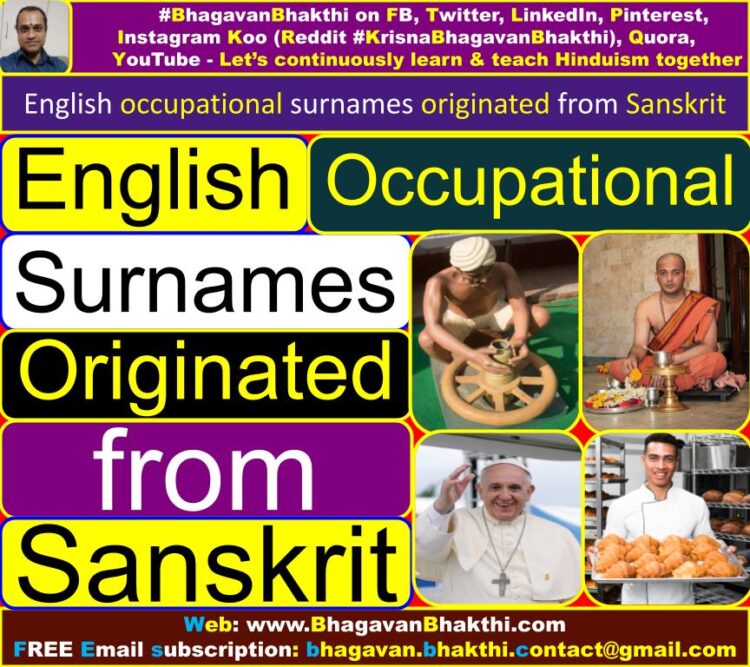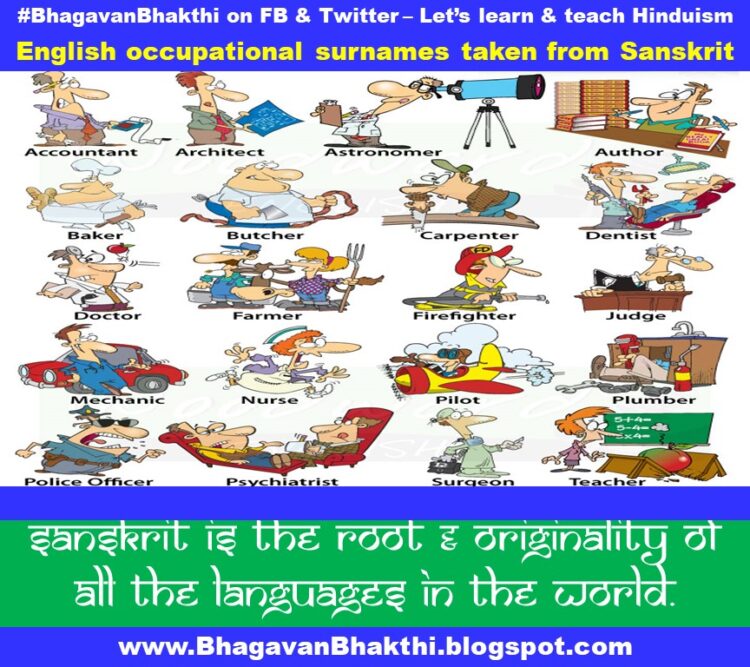Which English occupational surnames originated from Sanskrit
Namaste friends, how are you doing today? Welcome to #BhagavanBhakthi website / blog.
Let you and your well-wishers prosper, be healthy and be fearless through out your life term.
In this website / blog, you will always learn about #Sanskrit language.
Also subscribe to my YouTube channel from this link #BhagavanBhakthi to view videos about #Hinduism #Sanskrit language.
Just before going to “English occupational surnames originated from Sanskrit“, let us know a brief, basic and very important information.

Sanskrit has always given a lot to the world. From numeric 0, 1, 2, 3, 4, 5, 6, 7, 8, 9 etc. to all the words to the world including, but not limited to Europe, Africa, Americas, Chinese, Japanese, etc.
All the numeric and words which are been used in today’s modern languages are nothing but the words taken from Sanskrit.
This may look strange to few people, but this is the reality. English words like:
‘No’, ‘Mother’, ‘Father’, ‘Brother’, ‘Flower’ etc. has been taken from the Sanskrit words ‘na’, ‘matru’, ‘pitru’, ‘bhratru’, ‘pushpam’ etc.
Similarly all the English occupational surnames are been taken from Sanskrit itself. Let us know how this has happened.

1. Potter – This means somebody who makes the pots. In Samsruta / Sanskrit someone who makes the pots are known as ‘kumbhara’.
But the Sanskrit name for pot is ‘patra’ (read as paatra). Very clearly the English word ‘pot’ or ‘potter’ is taken from Sanskrit word ‘patra’.
2. Roy – This a a surname who belongs to a royal family. This word is directly taken from the Sanskrit word ‘raaya / raay / ray’.
In south India there is great saint called ‘Sri Raghavendra Swamy’. This great saint has a short name called ‘raayaru / raaya ji’, which means giving respect as a royal person.
3. Priest – He is the one who make the worship / pooja of the God. In Sanskrit ‘purohita / purohit’ means priest.
Very clearly this English word ‘priest’ is taken from the Sanskrit word ‘purohita / purohit’.
4. Pope – He is the head of the Christian community. In Sanskrit the word used is ‘Pujari.
5. Dairyman – This means somebody who is involved in dairy products. In Sanskrit ‘dadhika / दधिक / ದಧೀಕ’ has the same meaning.
Here ‘dairy’ is taken from ‘dadhika’ and man from ‘manushya / manu’.
6. Abbot – This means somebody who is a head monastery. In Sanskrit ‘mathadhipati’ (मठाधिपति / ಮಠಾಧೀಪತಿ) means ‘abbot’.
The English word ‘abbot’ is a mispronounced word from the Sanskrit word ‘mathadhipati’ = ma + tha + dhi + pati = here ‘ma’ has become simply ‘a’, ‘tha + adhi ‘ has become ‘bbot’.
Many must know how the Indian places names like ‘Visakhapatnam’ was changed to ‘Vizag’,
or ‘Tiruvananthapuram’ was changed to ‘Trivandrum’ by the Europeans, because they are not able to spell the words properly, especially the English people.
7. Alderman – This means somebody who is the head of a place.
In Sanskrit ‘nagaravruddha’ means an elderly man who is also a head of a place. The Sanskrit word ‘nagaravruddha’ = nagara + vruddha.
Here the Sanskrit word ‘nagara / nagar’ has became ‘alder’ in English. Also we know in Sanskrit ‘manushya’ means ‘man’ (taken from ‘manu’).
Very clearly the English word is a mispronounced word from the Sanskrit word.
8. Baker – This means somebody making / baking food. In Sanskrit ‘bhakshakara’ (read as bhakshakaara) / भक्षकार / ಭಕ್ಷಕಾರ means someone who prepares food.
Very clearly the English word ‘baker’ is taken directly from the Sanskrit word ‘bhakshakara’.
9. Dancer – This means somebody who know about dance. In Sanskrit ‘tandavakara / ताण्डवकारा / ತಾಂಡವಕಾರ’ means dancer.
Dance is taken from the Sanskrit word ‘tandav / ताण्डव / ತಾಂಡವ’. Very clearly the English word is taken from Sanskrit.
10. Royal person – This means a person who belongs to a royal family. In Sanskrit royal means ‘rajya / raaya’ etc and person means ‘purusha / purush’.
Again very clearly the English words are taken from Sanskrit words.
11. Cook – He is the one who makes the food. In Sanskrit ‘ पाकुक / pakuka / pakuk’ (read as paakuka / paakuk) means a cook.
Give importance to the second part of the Sanskrit word, that is, paakuka = paa + kuka (kuk). Here the English word ‘cook’ is a short form of the Sanskrit word ‘kuka / kuk’.
We should always remember Europeans can’t pronounce the words clearly and thus usually they have the habit of breaking the larger words into smaller words e.g.,
The Indian cities towns like ‘Vishakhapatnam’ was broken down as ‘vizag’ and ‘Tiruvanantapuram’ was broken down as ‘Trivandrum’.
12. Teacher – Someone who teaches is a teacher. In Sanskrit there is a beautiful word called as ‘आचार्य / ಆಚಾರ್ಯ / aacharya’.
Here if we break the Sanskrit word, that is, aacharya = aa + charya. Here give importance to the second part of the English word ‘teacher’, that is, te + acher.
Very clearly the English word is a mispronounced word from the Sanskrit word.
13. Armorer – He is the one who is the maker, supplier or repairer of weapons or armory.
In Sanskrit ‘varman / varma’ means someone which has the same meaning as the English word ‘armorer’. Also in Sanskrit ‘kara / kar’ means doer.
Armor + er is taken from the Sanskrit words varman / varma + kar. Even in many parts of India this surname is been used.
14. Accountant – In Sanskrit ‘AGnika’ / आङ्किक means accountant.
15. Astronomer – In Sanskrit ‘antariksha gnani’ means someone who reads about outer space.
16. Carpenter – In Sanskrit ‘Kashtha’ / काष्ठ means timber or wood. Carpenter = Karpenter.
17. Dentist – In Sanskrit ‘danta’ / दन्त means tooth. Someone who works on ‘danta’ is Dentist in English.
18. Police – In Sanskrit ‘puraadhipati’ / पुराधिपति means someone who is the head of a place and he will be responsible for the security of that particular place.
Another word for this is ‘arakshaka’.
19. Archer – In Sanskrit ‘astrin’ / अस्त्रिन् means someone who is holding the weapons like bow.
20. Astronaut – In Sanskrit ‘antariksha’ means space. In English someone who travel to space is called as ‘Astronaut’.
21. Barber – In Sanskrit ‘bhANDika’ / भाण्डिक means Barber.
22. Chauffeur – Sanskrit word for this is ‘chalakakaara’ or simply ‘chaalaka’.
23. Charioteer – ‘Saarati’ means charioteer in Sanskrit.
24. Cobbler – ‘Charmakaara’ / चर्मकार (someone who deals with skin) means cobbler in Sanskrit.
25. Composer – ‘Sangeetakaara’ means composer. Usually many time Euopeans use ‘ka’ / co / ca instead of ‘sa’ in Sanskrit.
Another example is ‘community’ is originated from ‘samudaaya’ of the Sanskrit word.
26. Consultant – Here also same thing. Sanskrit word for this is ‘salahakaara’. Instead of ‘sa’, English people pronounce it as ‘ka’ / ca / co.
27. Dancer – This has come from the Sanskrit word ‘tandavakar’. Here ‘tan’ has become ‘dan’.
28. Dermotologist – The Sanskrit word is ‘charmakara’. Here ‘charma’ has become ‘dermo’.
29. Doorman – Sanskrit word is ‘dvaramanushya’. Dvara has become door and manushya has become man.
30. Drummer – Sanskrit word is ‘damarukara’. Many must know Lord Shiva has ‘damaru’ in his hand.
31.
More information will be added to this on regular basis, please visit after some time to know more information.
To watch videos on #Hinduism #Sanskrit language, SUBSCRIBE to my YouTube channel from this below link:
#BhagavanBhakthi YouTube channel
To know the list of English and other languages words taken from Sanskrit, you can visit the below link:
English words taken from Sanskrit
For more information you can visit these below links:
English words taken from Sanskrit Part 1
English words origin from Sanskrit Part 2
List of Arabic words originated from Sanskrit
List of Japanese words originated from Sanskrit
Sanskrit history, facts, information, greatness, etc.
What is the relationship between Sanskrit and other languages
Dear friends, if you need any clarifications about this post, kindly let me know, I will definitely try to answer all of them.
Also your one LIKE, one COMMENT, One Share, one SUBSCRIPTION is highly important.
This will help to know the quality of this content and also it will be helpful to know if any improvements is required for the content.
If you feel this content is useful to you and has helped you to improve your knowledge, kindly share this with your well-wishers.
Because “SHARING MEANS CARING”.
For receive FREE EMAIL SUBSCRIPTION about #BhagavanBhakthi, you can send an email to [email protected] from your email ID.
NAMASTE!
Sri Gurubhyo Namaha
Sri Krishnaaya Namaha
Sri Krishnaarpanamastu
Share in Social Media